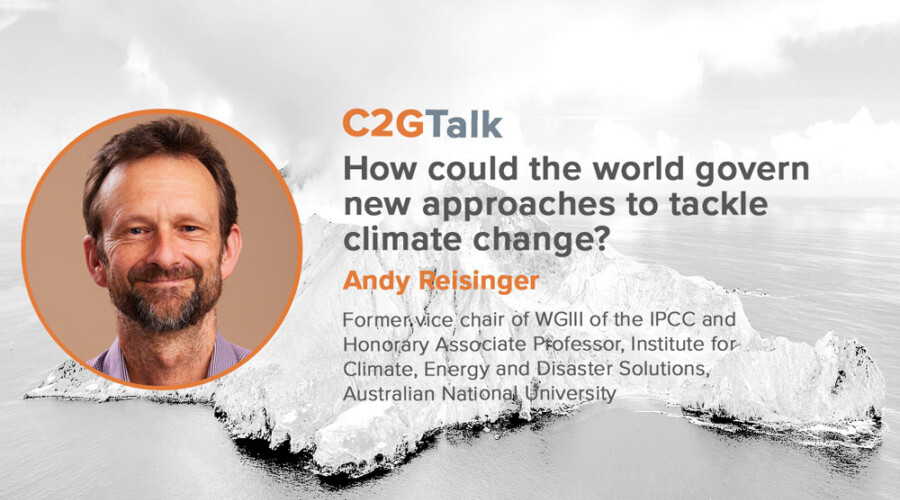Even though U.S. public policies are often lagging behind, pressures from shareholders and investors, greater transparency, and heightened risk awareness are all contributing to a new focus on sustainability for many companies, says Mindy Lubber.
Today on the program we're talking about investor and civil society's impact on corporate sustainability issues. Here with me is Mindy Lubber, president of Ceres, a coalition of investors, environmental organizations, and other public interest groups who work with companies to address sustainability.
Lubber has some impressive sustainability credentials to her name, from the Skoll Social Entrepreneur Award to her position as regional administrator of the U.S. Environmental Protection Agency.
Mindy Lubber, thanks for joining me on Just Business.
MINDY LUBBER: Thanks for having me. Good to be here.
JULIA TAYLOR KENNEDY: Let's start with the investors themselves. Investment in companies is often seen as a mostly profit-driven activity. How have social and environmental values begun to enter into this investment space?
MINDY LUBBER: What investors are looking at right now is the very small risk analysis and opportunity analysis that they apply when they think about inflation or currency risk or any number of other risks. Investors now are more and more understanding that water could easily be a financial risk to dozens, if not hundreds, of companies. If you are in the agricultural industry and there's not enough water, even if there's a minor drought in parts of California, that could be billions of dollars of losses over the course of one growing season. Those are real numbers.
Right now we are seeing more and more players integrate the financial implications of water, of natural resources, of climate into their day-to-day analysis. They are doing it for a number of reasons. One is, they better understand that these are real and legitimate financial risks. Two, the data is more available. It's not seen as something that's trendy, but you really can't get your hands on the numbers.
Seventy percent of analysts use Bloomberg terminals. Bloomberg terminals now have ESG [environmental, social, and governance] data on their terminals. Just like every analyst turns it on and gets information about a company's return or value or profits over the last year, they can also get similar information on environmental implications for the company, violations of environmental laws, risks they face, and so on.
So part of the change comes from a greater awareness, part of it comes from there being more information available, and part of it comes from the SEC itself, which has now mandated the disclosure of climate risk for companies that are publicly traded and file 10-Ks, the formal financial filings. They have said very clearly that these are not risks to be ignored; they are risks to be disclosed to investors who rely on the SEC to make sure that companies provide appropriate information.
From all sides, whether it's companies having more awareness, investors being able to access more data, or the regulatory agencies, like the Securities and Exchange Commission, mandating that climate risk is a material risk, times have changed. And they are changing in the right direction. This is not a trend. It is not a campaign. It is an authentic set of risks that need to be factored into our economic analysis.
JULIA TAYLOR KENNEDY: Your organization, Ceres, began soon after the Exxon Valdez oil spill. It started working on issues as an advocate for corporate reporting of environmental impact and the kinds of metrics that you just mentioned.
Seeing all this success, can you say, "Okay, that hurdle we have crossed, and now we need to move into new areas"? Or does it continue to be an issue to get these companies to really fully report what their impact is?
MINDY LUBBER: I wish I could say, "We're there. See you around. I'm going to take a long sabbatical, and I'll come back and think about the next effort."
We have come a long way, as you said. Twenty years ago, around the time of the Exxon Valdez oil spill, it wasn't considered appropriate on the part of the financial community or corporate community to think about worker safety in the same way that they do now or natural resource depletion or pollution—air pollution, water pollution, carbon pollution. It's very different now. People understand that these are real financial matters.
Now, understanding and absolutely acting on it are very, very different. Even the most environmentally conscious corporations—those who are really trying to push the limits—are probably, on a scale of 1 to 100, at a 7 or an 8, and many behind that. We still have a long way to go. Right now there is better understanding. There is even better reporting. About 2,000 companies use the Global Reporting Initiative, a system we designed and launched out of Ceres in the mid-1990s that allows corporations to have clear guidelines for reporting on sustainability metrics within their firms.
Reporting is getting better, but there are still thousands of companies who are not reporting. But now we have to move from reporting to actual performance. I'm delighted when companies report their sustainability metrics, what they are doing about carbon, water, air, but we need them to set goals now and we need them to report on what they are doing to meet those goals.
We have gone from a moment in time where more information is good—and when companies report on their sustainability footprint, they act on it more. It's a very good thing. But what we have to be looking at is bottom-line performance. If your carbon emissions were X last year, what are they this year? What are the implications if you don't start bringing those emissions down? Those are the changes we need to see.
So the sabbatical is not yet on my short-term agenda, but, rather, moving companies from disclosure and reporting to really changing their performance, and changing it in every way. It is not about changing the way they put light bulbs in the firm. That's a good thing, and companies ought to do that. But we need to see corporations have a board committee—and see this as a major governance issue—that sets goals around sustainability and ties their CEO compensation to sustainability metrics, like they tie it to other metrics, and these issues get integrated into the corporate strategic planning and their enterprise risk management. Their products look different, as well as their facilities. They demand more of their supply chain.
The key and important thing is, it's not about a special initiative. I applaud companies that do something on recycling or use slightly less toxic materials in the products they make. They deserve credit, and they ought to keep doing that. But being a sustainable corporation where many of the newest MBAs want to work and where employees are more motivated is about integrating sustainability from the boardroom to the copy room. It is not about a treasure hunt for energy waste once a year. It's integration into research and development, into everything a firm does.
We are seeing some of that, but, to be sure, we need to see a lot more.
JULIA TAYLOR KENNEDY: I'm glad you went into corporate governance, because I want to ask a little bit about that. So much of the rhetoric around environmental investing and investing that's attached to sustainability concerns deals with choice and choosing companies that are moving in the right direction.
Beyond the choice, can you think of a good example of one of these major investors that you work with and a real impact that they have managed to have as a member of the board or as a major investor in a corporation?
MINDY LUBBER: What we've seen over the last five years—and a bit more even—is that shareholders are doing things like filing shareholder resolutions and then voting their proxies. We have seen votes of 25, 30, 35 percent at companies where shareholders have said, "Building another coal-fired power plant is a bad financial investment, and we don't want you to do it." And we're seeing some response from companies to shareholders who are exercising their democratic right as owners of the company and who are voting their proxies.
Shareholders are doing that day after day and in many, many ways. There is a group of shareholders who are sending a letter to the Russell 1000, 1,000 of the largest companies, urging them to adopt a roadmap that Ceres developed, our sustainability roadmap for corporate behavior, what we consider to be best practices for corporate behavior in the 21st century. It's investors who are saying to companies, "We want you to be cautious and conservative, and that means being proactive around the environment and social issues, and make sure you limit your risks." More and more investors are calling on companies to do that, and more and more companies are responding.
JULIA TAYLOR KENNEDY: I want to change the topic a little bit and go back to something you started to touch on in one of your earlier answers when you were talking about fuel economy standards, getting the public sector involved and working to save jobs in Michigan. There has been a lot of focus from President Obama—Winning the Future—on seeing green investment in the United States as something that's patriotic.
What do you think of that as an incentive in this sustainability movement?
MINDY LUBBER: There are several different points. One is how we look at sustainability and frame it. Then I'm going to come back and talk about public policy.
What we have to do when we look at sustainability—again, not only is it not a tree-hugger issue or something only those environmentalists who work for a company care about; it's something shareholders care about. But they care about it for financial reasons, as well for national security reasons and many others. These issues run to the security and well-being of our country and, certainly as it relates to climate change, of our world.
But something like fuel economy standards is the perfect example. We just did a study with Citigroup that concluded that high fuel economy standards, meaning 60 miles per gallon of gas, not only would have an implication on our dependence on oil and our being largely hostage to a bunch of countries where there are not leaders that any of us feel very comfortable putting our future in their hands—an enormous amount of our security is tied up in oil in the Middle East, a very volatile part of the world. That's not a place we want to be, either economically or national security-wise. So we have to be looking at, what are the changes that both strengthen us as a country and strengthen our economy as a country?
Fuel economy standards—some may think, "Well, that's more regulation. It has to be bad for business." It is more regulation, but it's regulation that all the economic studies that we have seen suggest is good for business. It creates jobs. It creates more small businesses, who feed the supply chain of the large automakers. So we have to tie all of these things together.
But we can't expect capital markets to do everything if there aren't the right policies in place. What then happens is that progressive companies, who really want to do what's right and get it right, may very well spend some money trying to bring their carbon emissions down and release fewer toxic chemicals into the air and less pollution and use different kinds of glues to make their products or different materials. If they are spending money to do that, but all of their competitors are ignoring a sustainability mission, we are putting them at a competitive disadvantage.
So we still, despite all of the legitimate economic arguments for integrating sustainability into capital markets—and much is being done around those arguments, because they are real and authentic, and companies and analysts are looking at that data—we also need public policies that level the playing field and make sure that all companies are held to the same standards, and that send the right market signals on an issue like global warming.
Right now carbon pollution in the United States costs zero, and when something is free, you get a lot more of it. Unfortunately, we are getting a lot more of something that may very well be creating a future that is entirely unsustainable for the next generation. We need to put a real price on carbon pollution, as they have in other parts of the world, as one means of stopping that pollution from going into the air. At the same time, it will jump-start the clean-tech economy.
When clean-technology companies really believe that the government is working to limit the growth of carbon emissions and more coal-fired power plants, that's when they are going to go out and start investing large money to get to scale with renewable energy.
Much can be done in the private sector, and much is being done. We are delighted to see the kind of progress we've seen over the last 20 years. But we absolutely need the public sector to step up, and we need the kinds of rules in place that reflect honest accounting and require consistency across all sectors and all companies.
JULIA TAYLOR KENNEDY: I'm curious how much of this is a competitive question, too. There has been a lot of incubation in Europe for green technology, clean technology. Now there's a lot of talk about green technology and energy-efficient products being developed for the Chinese market. Volkswagen just announced that they are developing an inexpensive one-person car that can get more than 200 miles per gallon on the highway that is going to come to market in China.
How much of this is a geopolitical question as well? What are the benefits and drawbacks to seeing it that way, that we are in competition with these other countries?
MINDY LUBBER: We need to be collaborative, as well as competitive. But there is no question; the United States is losing the battle right now or the race to being a leader in the clean-technology sector. China is in front of us, Japan is in front of us, Germany is in front of us. Investments are all going overseas, because we don't have the right policies in place in the United States. That means lost revenue streams and lost potential jobs. On all fronts, that's a catastrophe for the United States.
It doesn't mean that China shouldn't build their technology base. They should. But the United States cannot cede all of that business elsewhere. Deutsche Bank recently said they have $7 billion they were going to invest in clean technology, and none of it is going to the United States because the United States didn't put in place the right public policy signals. We have to heed those warnings and realize that we want those investments made here, because those investments will create new businesses and more jobs.
Our best shot at rebuilding and turbocharging our economy to look like it did around the Internet, and not just as a bubble, but as a long-term growth area, is going to be clean technology. Sending all of that money overseas makes no sense whatsoever. We need to stop that now and we need to see the investments going here. They are not going to come in a way where we can scale the change without the right public policies in place.
JULIA TAYLOR KENNEDY: Let's talk a little bit more about what Ceres is doing and some things that are moving forward here in the States. I was especially intrigued, as I was looking through the different industries that you work with, by some of the not-as-obvious sectors. There is oil, gas, and transportation. Everybody knows a lot about the questions and risks there. But one sector that has been getting a little more buzz lately, with a lot of these disasters that have been going on, is the insurance sector. It seems that you are doing some really interesting work with insurance companies on the types of risks that they face that are different than they were a few years ago.
How do you work with insurance companies on those risk metrics?
MINDY LUBBER: Insurance companies are crucial, for the following reason. One is, they are the leaders in analyzing risk. They have all the risk assessors that are out there. There are certainly a few others, but they are the leaders in that space. They are also major investors. Think about insurance companies. They take our premiums, and half of the company is about investing those premiums, which they do. It's a big part of what the insurance companies are about. I can think of no sector that can have a more profound impact on mitigating climate change, if in fact they come on board as spokespeople in the way they are doing in Europe.
The United States is behind. If you look at Swiss Re, Munich Re, Allianz, and AXIS, some of the big European insurers and reinsurers, they are starting to change the way they assess risk and change the way they price insurance. If you are on a coast and the risk is higher, they are going to charge you a whole lot more.
They are also starting to take positions on public policy. When insurers spoke in the United States on building codes and fire codes, that's when we saw the Congress change those standards, because insurers have to pay out the money when there are problems. We need them speaking up, and rightfully so, based on legitimate data, in their own business interests, because they paid out billions of dollars more than they had planned on Katrina.
The number of storms and changes in weather patterns are coming fast and furious, whether it was the heat wave last summer—we know that in many countries people died, and we saw unprecedented heat levels—whether it's the changes in our icebergs, the water that is disappearing in some parts of the country and flooding other parts of the country, whether it's windstorms or firestorms. The world is changing, and the climate is causing some of those changes. Insurers are going to pay a lot of money for the impacts of those things.
So they need to be at the front of the line in helping mitigate those problems. One way to do that is by leading on policy. Another way is by changing their products and charging more, which will impact behavior. Finally, it's about how they invest the money they have invested.
JULIA TAYLOR KENNEDY: It's interesting to think about those pricing questions, because then it would ostensibly affect people's choices to live near or far from the water. People who have less income couldn't afford to live closer to the water, because they couldn't pay for the premiums. Is that how you see it?
MINDY LUBBER: That's one of the most obvious, perhaps. But there are dozens of other ways. If an insurance company said, "We're going to offer insurance that basically says we will charge you substantially less if you drive 2,000 miles a year rather than the average 12,000 miles a year, so you're driving less, that's good for the environment. It's good for the economy in some ways. We'll charge you a lot less," they could provide the incentive for people to drive less. Or they could say to every board of directors, "We're going to charge more to the companies whose boards are not setting goals on sustainability risks or climate change."
There are ways for them to impact behavior substantially that go well beyond the big houses on the coasts, which impacts a smaller number of people.
JULIA TAYLOR KENNEDY: Let's switch entirely and go to the other end of the industry spectrum, to footwear and apparel. You have done a couple interesting projects with Timberland and Levi's. Tell me a little bit about those.
MINDY LUBBER: It's Timberland, Levi's, Nike and others. Those are what I would consider leadership companies. Each of them has said they are going to address climate change and sustainability in the fabric of their firm—not literally the piece of cloth fabric, but the essence of what they do as a corporation, in setting goals and how they act on them.
In Timberland's case, they have brought their carbon footprint down. They have looked at the materials that go into making their product. They also have a way of showing purchasers how much carbon went into making a particular product. So they are disclosing a whole set of data that consumers like to have but they generally can't get. Timberland has done some very unique things.
Then Levi Strauss, another leadership company—it used to be that I had the privilege of paying twice as much for a pair of jeans that used 100 times more water, so my daughter could buy jeans that looked like they were worn-out and had been made ten years ago rather than being brand-new. Levi said they don't want to be using water to make the jeans look like they are ten years old. They have a right to make money. They have an obligation to their shareholders. But they want to do it in a way that's more sustainable. They changed their practices and are now making waterless jeans, saving hundreds of thousands of gallons of water over short periods of time. They are looking at, how do they make their product differently?
They are also, on a human-rights and worker basis, saying, "We have certain standards for our workers here in the United States. We're now going to apply those standards around the world, even if the countries where we have manufacturing facilities don't have those standards."
So they have said, "We get that these things run to the strength of our ability to be a leadership company." They are implementing changes on a regular basis.
Nike, absolutely the same. Nike looks at what they put into their products, how do they make them using fewer resources, how do they use less glue that they used to put in their sneakers that they found out young children were sniffing. They want to find a way to make sure their products are as sustainable as possible, integrating that into what they do and how they do it.
Nike is willing to share patents and information on how to be more sustainable. Many corporations have heretofore felt like, "That's privileged information. We've spent money. We've done the research. We're never going to share that." Nike has said, "We have got to operate in a different way."
It doesn't mean they don't want to make money. They do and they are, and that's good. But they are finding ways to make their products more sustainable. That doesn't mean they are perfect. They have a long way to go. They are finding ways to take leadership positions, including sharing information that otherwise people would never consider sharing.
JULIA TAYLOR KENNEDY: When you're talking about these three companies—Nike, Timberland, Levi's—all three of them, it seems, have different ways of communicating the sustainability of the product and reaching out to consumers to let them know how the product is made and what goes into it. Levi has the branding and then they have more information on their website if you want to go there. Timberland, you said, has a little bit more rigorous reporting. Nike sounds like they have even more rigorous reporting.
I would imagine that this is the type of balance that you are dealing with with a lot of these companies, because there is reporting and then there is over-reporting and there is reporting in a way that investors and consumers will comprehend and then there is communicating in a way that might be an information dump. Then, of course, there is the cynical perspective that we hear so often, that companies don't really want to be revealing.
How do companies navigate that communications path? What do you recommend?
MINDY LUBBER: Reporting is quite important. Unlike early days, when it was a summary of their philanthropy—and I don't want to suggest that philanthropy is not crucial for a company, but that's not sustainability; it's philanthropy. It's a good thing, but it's separate.
We don't want sustainability reports to be greenwashing efforts. We want them to be data-driven, goals-driven, candid, and transparent. One way that we urge companies to do that is using the Global Reporting Initiative standards and systems that we designed and have evolved since Ceres launched the Global Reporting Initiative in the mid-1990s.
Our expectation for the 21st-century corporation is that they have to engage with stakeholders, that once or twice or three times a year, they meet with stakeholders who are experts in the field of sustainability, who comment, who critique, who advise them on their sustainability reports, how to make them more precise, more clear, more metrics-driven, and more candid. As we tell companies, "You don't have to do everything perfectly, but you should be transparent, because then stakeholders can follow what you're doing and understand where you're doing it right or where you need more support."
Reporting has gotten better. Is it perfect? No. But it has gotten substantially better.
One effort that we are involved in internationally is getting to a point—and I would guess this will take five years, not two—to have integrated reporting, where sustainability reports are not separate from financial reports. They are one report that is integrated.
JULIA TAYLOR KENNEDY: You mentioned transparency. It seems, whether you are working with companies on their disclosure in reporting or investors on injecting their environmental concerns, Ceres is fundamentally concerned with this value of transparency. Why do you see that as a key element to an ethical marketplace?
MINDY LUBBER: Companies can't really fix their sustainability problems—how much water they use, what kinds of resources they use in their products, how they are doing their research and development—unless they understand what their footprint and impact is. Once they measure it, they have a much better ability to manage it. But I would argue, for a company that doesn't look, doesn't see, doesn't want to know, they are not going to bring their footprint down. They are not going to mitigate the risks that their shareholders are facing.
So reporting matters. It matters because companies manage things better when they report on it, and it allows investors to know, when they are about to invest in a company. "Do I really want to invest in that company that has more Superfund sites than any other company in their sector, more EPA violations than any other company in their sector, and more risks than other companies?"
So information, if it's useful and good, allows you to make smarter decisions. It's impossible for an investor to decide whether a company has undue water risks. They are an agricultural company perhaps. They may be in Nevada, where we have seen drought after drought. They are trying to suck water from Lake Mead into that part of the country. But if those companies aren't going to have enough water to run their businesses, and they may very well produce less product next year than they did this year and less product the year after, investors want to know that.
So making sure that companies disclose their risk and analyze that risk allows them to act on it and it allows investors to make smarter decisions.
JULIA TAYLOR KENNEDY: Mindy Lubber, these have been fascinating responses, and I really do appreciate your taking the time to share with me. Thanks for joining me on Just business.
MINDY LUBBER: Great. Thank you so much.




